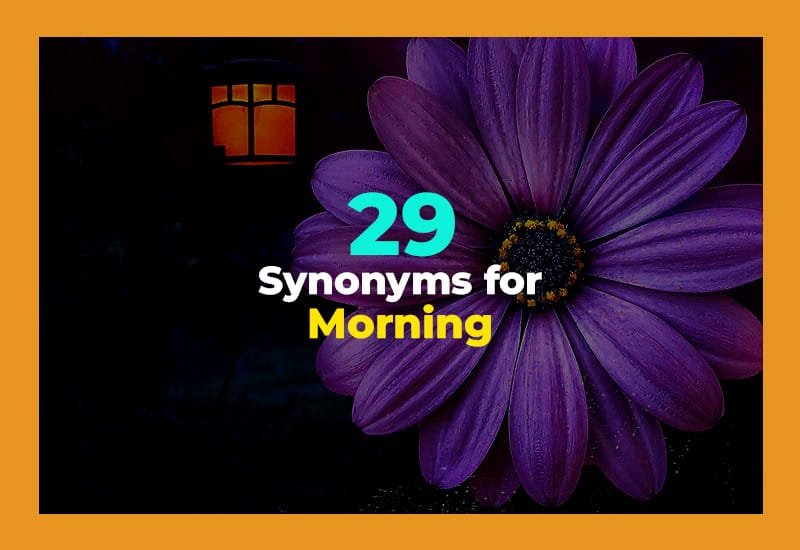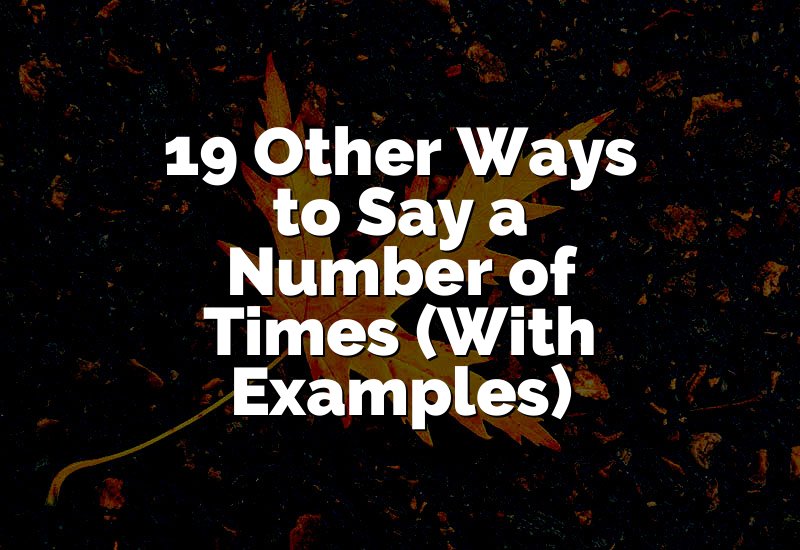Morning is such a bright and hopeful part of the day. It's when everything feels new and full of energy. But did you know there are many fun and beautiful ways to say "morning"? Words like dawn, daybreak, or sunrise all capture that feeling in a different way. In this article, we'll explore 29 synonyms for morning with examples.
29 Different Ways to Say MORNING: Another Word for Morning
1. Dawn
Dawn is the very first light that appears in the sky before the sun rises. It's the moment when darkness begins to fade and the world slowly wakes up. You can use "dawn" when you want to sound a little poetic or peaceful. It's often used in writing, songs, and stories. Dawn gives a sense of new beginnings and quiet beauty. It's perfect for describing soft and calm moments early in the day.
- The city looked peaceful at dawn.
- She went for a walk at dawn to clear her mind.
- Birds started singing at the break of dawn.
2. Daybreak
Daybreak means the time when the day actually begins, right when the first light fills the sky. It's a lovely word that feels fresh and energetic. You can use "daybreak" when describing a time filled with hope or the start of something new. It's also common in nature writing or early travel scenes. Daybreak carries a slightly dramatic and lively tone, which makes it great for storytelling.
- Fishermen left the harbor at daybreak.
- We reached the mountain top by daybreak.
- At daybreak, the fields were covered in golden light.
3. Sunrise
Sunrise describes the moment when the sun actually appears over the horizon. It's one of the most visual and beautiful ways to talk about morning. People use "sunrise" to describe scenery, travel experiences, or peaceful starts. It's perfect when you want to highlight color, warmth, and new energy. Sunrise always brings a feeling of promise and calmness.
- We watched the sunrise together at the beach.
- The sunrise painted the sky pink and orange.
- Every sunrise reminds me of new beginnings.
4. Sunup
Sunup is a friendly and informal way to say morning or sunrise. It's often used in everyday talk or in stories that sound casual. When you say "sunup," it feels natural and simple. This word is often heard in rural settings or outdoor adventures. It brings a cozy, country kind of feeling to your sentence.
- We started our hike right after sunup.
- Cows were already grazing by sunup.
- The air felt cool and fresh at sunup.
5. Early Hours
The phrase "early hours" refers to the time just after midnight or before most people wake up. It's often used when describing quiet or reflective moments. You can use it when you want to sound descriptive without being too poetic. It fits well in both everyday talk and writing. It shows the calm before the rush of the day begins.
- She finished her project in the early hours of the morning.
- The streets were empty during the early hours.
- He loved the stillness of the early hours.
6. First Light
First light is the moment when you can first see daylight. It's a calm, simple way to describe the very start of morning. It's used in travel stories, nature writing, or peaceful scenes. The phrase sounds gentle and natural, perfect for describing a soft morning mood. It brings an image of quiet, soft colors, and a slow start to the day.
- They started their journey at first light.
- The first light touched the mountain peaks.
- We woke up at first light to catch the train.
7. Daylight
Daylight means the natural light that comes from the sun during the day. It's a great word for when the night is over, and everything becomes bright again. People use it in both casual talk and writing. It's a neutral but warm word that brings to mind brightness and clarity. Daylight can symbolize safety, hope, and energy.
- The city looks different in daylight.
- We didn't stop driving until daylight appeared.
- She felt better when daylight came through the window.
8. Break of Day
Break of day sounds poetic and lovely. It refers to the moment the day begins, just like dawn or sunrise. You can use this phrase to describe peaceful starts or scenes filled with hope. It's often used in songs, poems, or storytelling. It gives a calm but romantic tone to your writing. It makes you picture nature waking up gently.
- They reached the village by the break of day.
- He waited at the river until the break of day.
- The break of day brought warmth to the cold night.
9. Morningtime
Morningtime is a simple, cheerful word for the morning hours. It's often used in everyday language, especially when speaking warmly or casually. It feels cozy and friendly, like something you'd say to family or kids. It's a fun way to make your writing sound relaxed. Morningtime brings a sense of comfort and familiarity.
- It's morningtime, time to wake up!
- The house smelled like coffee during morningtime.
- Morningtime walks are my favorite part of the day.
10. AM Hours
AM hours simply mean the time before noon. It's often used in a factual or formal way. You might see it in schedules, work settings, or travel plans. It's straightforward and modern. Even though it's not poetic, it's still a good synonym when talking about time clearly. It shows structure and order, which fits well in business or study talk.
- The store opens during the early AM hours.
- He exercises every day in the AM hours.
- Meetings usually happen in the AM hours.
11. Aurora
Aurora means the early light of morning and also refers to natural lights seen in the sky. It's a beautiful and poetic word. When you say "aurora," it feels magical and elegant. It's great for storytelling or describing stunning morning scenes. Aurora brings color, mystery, and a dreamy tone to your sentence. It's not common in casual talk but sounds amazing in writing.
- The aurora lit up the sky before sunrise.
- She admired the soft aurora over the hills.
- Aurora signaled the start of a peaceful morning.
12. Morrow
Morrow is an old-fashioned word meaning the next day or the morning. It's rarely used in daily speech but often appears in poems or classic writing. When you use "morrow," it gives your words a timeless and elegant feeling. It's perfect for stories set in the past or for adding charm to your writing. It connects with the idea of renewal and promise.
- Until the morrow, my friend.
- He promised to return on the morrow.
- The morrow brought new hope to the weary travelers.
13. Peep of Day
Peep of day means the very first moment when light starts showing. It's a sweet and old-fashioned phrase. You can use it when describing calm or nostalgic scenes. It has a gentle sound, perfect for cozy or romantic writing. It creates a picture of soft light peeking through the darkness.
- She woke up at the peep of day.
- The farm came alive at the peep of day.
- They started their trip at the peep of day.
14. Crack of Dawn
Crack of dawn means the very start of the morning, often when it's still a bit dark. It's a fun and casual phrase used in daily talk. You can use it when you want to sound lively or playful. It fits well when talking about early starts, travel, or work. It brings energy to your sentence.
- We left home at the crack of dawn.
- He's always awake at the crack of dawn.
- The runners gathered at the crack of dawn.
15. First Blush
First blush is a poetic phrase that means the first light or color of morning. It's often used to describe soft, pretty moments. It sounds delicate and romantic. Writers use it to make descriptions more beautiful. It works well when you want to paint a picture with words. It gives a lovely and gentle feeling.
- The sky turned pink at first blush.
- At first blush, the world looked calm and new.
- She watched the hills glow at first blush.
16. Early Morn
Early morn is a shortened and poetic way to say early morning. It sounds simple but musical. You might see it in poems or peaceful writing. It brings an old-time charm that makes it sound soft and pleasant. It's best used when you want your sentence to feel gentle and warm.
- The air was cool in the early morn.
- Birds chirped happily in the early morn.
- The early morn mist covered the valley.
17. Dewy Hours
Dewy hours refer to the early part of the day when dew still covers the grass. It's a very visual and calming phrase. It works beautifully in writing that describes nature or quiet mornings. The phrase gives a sense of freshness and peace. It's perfect for creative and poetic writing.
- The garden looked lovely in the dewy hours.
- They took a walk during the dewy hours.
- She loved the smell of flowers in the dewy hours.
18. New Light
New light means fresh brightness or a new beginning. It's often used to show hope or a positive change. You can use it literally for morning light or figuratively for new understanding. It's a simple but meaningful phrase that feels uplifting. It suits both everyday talk and emotional writing.
- The valley looked different in the new light.
- Each day begins with new light and hope.
- The new light brought warmth to the cold ground.
19. Morningtide
Morningtide is an old-fashioned, poetic word for morning. It sounds romantic and peaceful. Writers often use it to create a dreamy or timeless feeling. It's not common in modern speech, but it adds elegance to any sentence. It connects the feeling of morning with beauty and calmness.
- The bells rang in the morningtide.
- Morningtide filled the sky with soft colors.
- They met by the river at morningtide.
20. Day's Awakening
Day's awakening means the moment when the world wakes up as the sun rises. It's a lovely and descriptive phrase. You can use it in poetic or thoughtful writing. It gives a sense of life returning after sleep. It fits scenes that show calm, hope, or renewal.
- The forest came alive at day's awakening.
- She felt inspired at day's awakening.
- Day's awakening brought peace to her heart.
21. Beginning of the Day
Beginning of the day is a simple and clear phrase that everyone understands. It's perfect for both formal and casual writing. It doesn't sound poetic but works well in realistic situations. It's a great synonym when you want to sound plain and easy. It also works nicely for talking about routines or work.
- We plan our goals at the beginning of the day.
- The beginning of the day always feels peaceful.
- Breakfast is the best part of the beginning of the day.
22. Early Rise
Early rise means waking up early in the morning. It's often used to talk about habits or routines. It gives a sense of discipline or productivity. You can use it to describe an active or healthy lifestyle. It's great for motivational writing or everyday talk. It always feels positive.
- She loves an early rise to get more done.
- An early rise makes the day feel longer.
- He enjoys the quiet that comes with an early rise.
23. First Dawn
First dawn means the very beginning of daylight. It's a soft, descriptive phrase. You can use it when describing peaceful, quiet, or hopeful scenes. It's often found in storytelling or travel writing. It gives a strong image of a new start.
- They reached the camp at first dawn.
- First dawn brought gentle light over the hills.
- I love the stillness of first dawn.
24. The Waking Hour
The waking hour means the time when most people start to wake up. It's a friendly and relatable phrase. You can use it when talking about daily life or morning habits. It sounds warm and natural. It gives a feeling of life slowly beginning again after sleep.
- The streets come alive during the waking hour.
- The waking hour is perfect for coffee and quiet time.
- She loves reading during the waking hour.
25. Sun's Ascent
Sun's ascent describes the moment the sun rises higher in the sky. It's a more descriptive and artistic phrase. It fits well in creative writing or travel pieces. It gives an image of power, growth, and light spreading across the world. It's not very common, which makes it feel unique.
- The sun's ascent painted the sea with gold.
- At the sun's ascent, warmth filled the valley.
- The sun's ascent marked the start of a new day.
26. The Start of Day
The start of day is a simple and easy way to say morning. It's perfect for daily use or when writing plainly. You can use it to describe routines, work, or peaceful moments. It's direct but still warm. It's a good phrase for both speaking and writing.
- The start of day is when I plan my schedule.
- The start of day feels calm and fresh.
- We began our work at the start of day.
27. Light's Return
Light's return means the coming back of sunlight after night. It sounds poetic and full of hope. You can use it when writing about renewal, comfort, or joy. It's perfect for emotional or artistic writing. It connects with themes of light and life.
- Light's return made the forest glow again.
- She smiled at light's return after the long night.
- The town woke up at light's return.
28. The Fresh Hour
The fresh hour refers to the early part of morning when everything feels new. It's a cheerful and simple phrase. You can use it to describe energy and renewal. It's not common, but it sounds warm and inviting. It makes people think of cool air and new starts.
- I enjoy running in the fresh hour.
- The fresh hour brings peace and focus.
- The fresh hour makes the day feel special.
29. The Golden Hour
The golden hour means the time just after sunrise or before sunset when the light is soft and golden. It's often used in photography and writing. It's perfect for describing beauty and calmness. It makes everything look warm and magical. It's one of the most loved ways to describe morning light.
- The golden hour is perfect for taking photos.
- She loves the calm glow of the golden hour.
- The beach looked magical during the golden hour.
Table of Synonyms for Morning
| Synonym | Example |
|---|---|
| Dawn | The city looked peaceful at dawn. |
| Daybreak | We reached the mountain top by daybreak. |
| Sunrise | The sunrise painted the sky pink and orange. |
| Sunup | We started our hike right after sunup. |
| Early Hours | She finished her project in the early hours. |
| First Light | They started their journey at first light. |
| Daylight | The city looks different in daylight. |
| Break of Day | They reached the village by the break of day. |
| Morningtime | It's morningtime, time to wake up! |
| AM Hours | He exercises every day in the AM hours. |
| Aurora | The aurora lit up the sky before sunrise. |
| Morrow | Until the morrow, my friend. |
| Peep of Day | She woke up at the peep of day. |
| Crack of Dawn | We left home at the crack of dawn. |
| First Blush | The sky turned pink at first blush. |
| Early Morn | Birds chirped happily in the early morn. |
| Dewy Hours | The garden looked lovely in the dewy hours. |
| New Light | Each day begins with new light and hope. |
| Morningtide | The bells rang in the morningtide. |
| Day's Awakening | The forest came alive at day's awakening. |
| Beginning of the Day | The beginning of the day always feels peaceful. |
| Early Rise | She loves an early rise to get more done. |
| First Dawn | They reached the camp at first dawn. |
| The Waking Hour | The waking hour is perfect for coffee and quiet time. |
| Sun's Ascent | The sun's ascent painted the sea with gold. |
| The Start of Day | The start of day feels calm and fresh. |
| Light's Return | Light's return made the forest glow again. |
| The Fresh Hour | The fresh hour brings peace and focus. |
| The Golden Hour | The beach looked magical during the golden hour. |

Final Thoughts
I hope you enjoyed learning all these wonderful ways to say "morning." Each word brings a special feeling, from poetic to simple and cozy. Whether you're writing a story, sharing a quote, or just want to sound creative, these synonyms will help. Try using them to make your everyday speech or writing brighter and more interesting.









